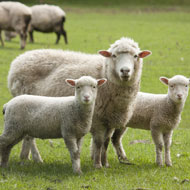Cattle test positive for BTV in northern France

BTV is transmitted by midges and can infect all ruminants, though sheep and cattle are most affected.
Farmers are being warned to look out for signs of bluetongue 8 (BTV-8) and to consider vaccinating their stock, after the virus was detected in a previously disease-free part of northern France.
Defra says the holding where BTV-8 was confirmed is less than 150km from the south coast of England. Farmers across the south of England in particular should be vigilant for clinical signs such as mouth ulcers, drooling, swelling of the mouth, head and neck, fever, lameness and breathing problems.
A safe and effective vaccine is available in Great Britain and livestock keepers - particularly those on the Kent and Sussex coastline - are being advised to speak to their vet about the benefits of vaccination.
BTV is transmitted by midges and can infect all ruminants, though sheep and cattle are most affected. It can reduce milk yield, cause sickness, reduce reproductive performance or, in the most severe cases, cause death in adult animals. However, the virus does not affect people, and meat and milk from infected animals are safe to consume.
Defra’s latest risk assessment states that the risk of an outbreak in the UK is currently low, but this will change as we move into summer.
Nigel Gibbens, the UK’s chief veterinary officer, said the detection of BTV in northern France is a “timely reminder” of the need to remain vigilant and to report suspicions to the Animal and Plant Health Agency immediately.
“We have robust disease surveillance procedures and continue to carefully monitor the situation in France, where bluetongue disease control measures are in place,” he added.



 RCVS Knowledge has welcomed Professor Peter Cockcroft as editor-in-chief for Veterinary Evidence.
RCVS Knowledge has welcomed Professor Peter Cockcroft as editor-in-chief for Veterinary Evidence.